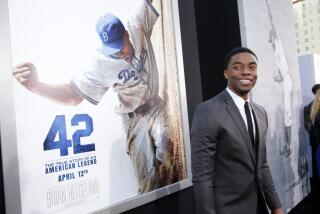‘McFarland, USA’ is an inspiring, fleet-footed tale
- Share via
An unapologetically inspirational Disney sports movie, “McFarland, USA” certainly sounds familiar, and to a certain extent it is. But a canny combination of elements unites with an unlikely true story to make this more effective than you might be expecting.
The based-on-fact narrative belongs to Jim White, played by Kevin Costner, a coach as Anglo-Saxon as his name. White started a high school cross-country team of Mexican American kids at impoverished McFarland High School in California’s Central Valley and helped it achieve an American Dream level of success no one could have imagined.
Costner, now a bit old to be playing the athletes who were central to his career in films like “Field of Dreams” and “Bull Durham,” has smoothly transitioned to playing a sports executive (last year’s “Draft Day”) and in “McFarland” a mentor for youth.
For the truth is no one can play earnest, tenacious, ordinary-hero Kevin Costner roles like Kevin Costner. Even though playing Coach White required no artistic heavy lifting on the actor’s part, the reliability of his presence is a genuine asset here.
As written by Christopher Cleveland & Bettina Gilois and Grant Thompson, “McFarland, USA” may sound like a white savior movie, one of those stories of light-skinned individuals improving the lot of their darker-skinned brethren, but it doesn’t play that way in part because of the director involved.
That would be Niki Caro, who has not made many films since her “Whale Rider” became an international sensation in 2002. As that picture demonstrated, Caro has a feeling for minority communities, and her empathy for the students of McFarland High and, equally important, their hardscrabble families, give this a caring, emotional core.
Caro insisted that the production shoot part of the time in McFarland itself, a town of some 12,000 about 25 miles north of Bakersfield, and the feeling we get from Adam Arkapaw’s cinematography for the heat and isolation of the place is essential. Caro even had the young actors who play the high school cross-country team, many of whom come from the area, run up and down huge mounds of plastic-covered almonds as the real McFarland runners did.
The director has also understood that the essence of this story, at least in the film version, is that Coach White needed saving as much if not more so than his runners, and that his discovery of what is of value in the community he’s entered is as important as what his charges get out of embracing cross country.
Though White apparently taught at the town’s junior high for a dozen years before moving over to the senior institution, “McFarland, USA” constructs a much more elaborate and fictional series of events to get him to the school in question.
The film starts in 1987 with a prologue in Boise, Idaho, where football coach White loses his temper with an arrogant high school player, an action that costs him his job and makes future employment prospects dim.
Which is how he ends up driving his wife Cheryl (Maria Bello) and two young daughters (Morgan Saylor and Elsie Fisher) through those dusty McFarland streets to their new home, which has a Virgin of Guadalupe mural on the living room wall (courtesy, presumably, of a previous tenant) and a woman who flies a Mexican flag as a neighbor.
Too poor to live in more upscale Bakersfield, gringos in a non-gringo land, the Whites are frankly scared of the foreignness of this farming community, imagining gangbangers behind every tree and in general being so unhappy that the two daughters hope their dad screws up again so they can move.
What happens instead is that White starts to notice how fleet of foot the young men at his high school are, especially Thomas Valles (Carlos Pratts), who, fueled as much by anger as necessity, runs from home to the fields to school and then back again, always at top speed.
White also notices, as do we, how hard these kids’ lives are, how they get up at 4:30 a.m. to pick crops with their parents before going to school and returning to picking once classes are over. He talks the school’s principal into starting a cross-country team, hoping to give these students a future divorced from the fields.
For that to happen, the coach (whose charges call him simply “White” and pack as much contempt as possible into the name) has to first convince the kids to compete and then win the trust of their parents, something that can only happen if he comes to fully understand what the challenges of their lives are. Yes, winning races is important, but in “McFarland, USA” it is not the only thing. Not even close.
------------
‘McFarland USA’
MPAA rating: PG for thematic material, some violence and language
Running time: 2 hours, 8 minutes
Playing: In general release
More to Read
Only good movies
Get the Indie Focus newsletter, Mark Olsen's weekly guide to the world of cinema.
You may occasionally receive promotional content from the Los Angeles Times.











